The request was for a knife suitable for a Norse woman.
Female grave finds from the Viking Age often contain a specific profile blade. Typically these are a narrow triangle, single edge to a sharp point. The cross section is a V grind, and often the thickness of the back also tapers towards the point. The size of most Norse knives is much smaller than our modern perceptions - blades in the range of 7 - 10 cm long is standard.
 |
| Artifact Knives from Coppergate at York, England |
Taken all together, this profile creates an ideal 'small tool' knife, with a sharp edge and easy to control point. The knife is thus ideal for fine exact cutting, as needed for textile work. It also is handy for kitchen work. So the result is a tool specifically designed for the kind of domestic tasks undertaken by Norse women.
 | ||
| Forged Blade beside one of the Artifact (scaled drawing) |
The starting billet was a small piece of 4 core twist that I had on hand. It is roughly 200 layers in total, not with a carbon steel core in this case. The finished blade is 10 cm long.
This is a close up of the completed (etched) pattern welding. The starting materials are more uniform, my guess is no wrought iron and less high carbon steel. This results in a less dramatic pattern. I also chose to leave the surface with a single solution (nitric) etch, which does create a texture, but results in a more uniform colour to the finish. This specifically to echo the simpler etching solutions (likely vinegar) that would have been available historically.


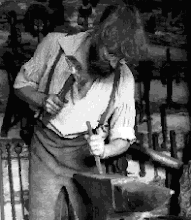
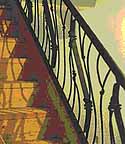
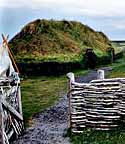
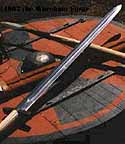
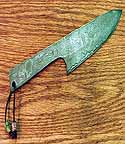















No comments:
Post a Comment